Togo: Instant messaging apps blocked amid 2020 presidential election
Maria Xynou, Arturo Filastò
2020-02-25
Last Saturday, on 22nd February 2020, presidential elections
were held in Togo. These elections follow a wave of protests
over the last years against the 53-year rule of Gnassingbe Eyadema and,
subsequently, his son, Faure Gnassingbe. A few days before the election,
non-partisan election monitoring was restricted as National Democratic Institute (NDI) staff were expelled
from the country. According to preliminary results from the electoral
commission, incumbent President Faure Gnassingbe won re-election.
Amid concerns that the Togolese government would restrict access to the
internet during the elections (similarly to other West African
countries, such as
Benin and
The Gambia), Access
Now’s KeepItOn campaign
published an open letter
encouraging the government of Togo to ensure a free and open internet
during the election. Access Now also encouraged the use of OONI Probe so that locals in
Togo could monitor the accessibility of online sites and services
through network measurement.
On election day, OONI Probe users in Togo
tweeted
that access to WhatsApp, Telegram, and Facebook Messenger was blocked.
In this post, we share OONI measurements collected from Togo
and discuss the blocking of instant messaging apps amid the country’s
2020 elections.
Blocking of instant messaging apps
Starting on election day (22nd February 2020), OONI measurements
collected by OONI Probe users in Togo
suggest that WhatsApp, Facebook Messenger, and Telegram were blocked on
two networks: Togo Telecom (AS24691) and Atlantique Telecom (AS37229).
All three apps, however, were accessible on the Canalbox (AS36924)
network, showing that blocking differed across ISPs in Togo.
The following chart illustrates the results from the testing of
WhatsApp, Facebook Messenger, and Telegram across three ISPs in Togo
between 21st to 23rd February 2020.
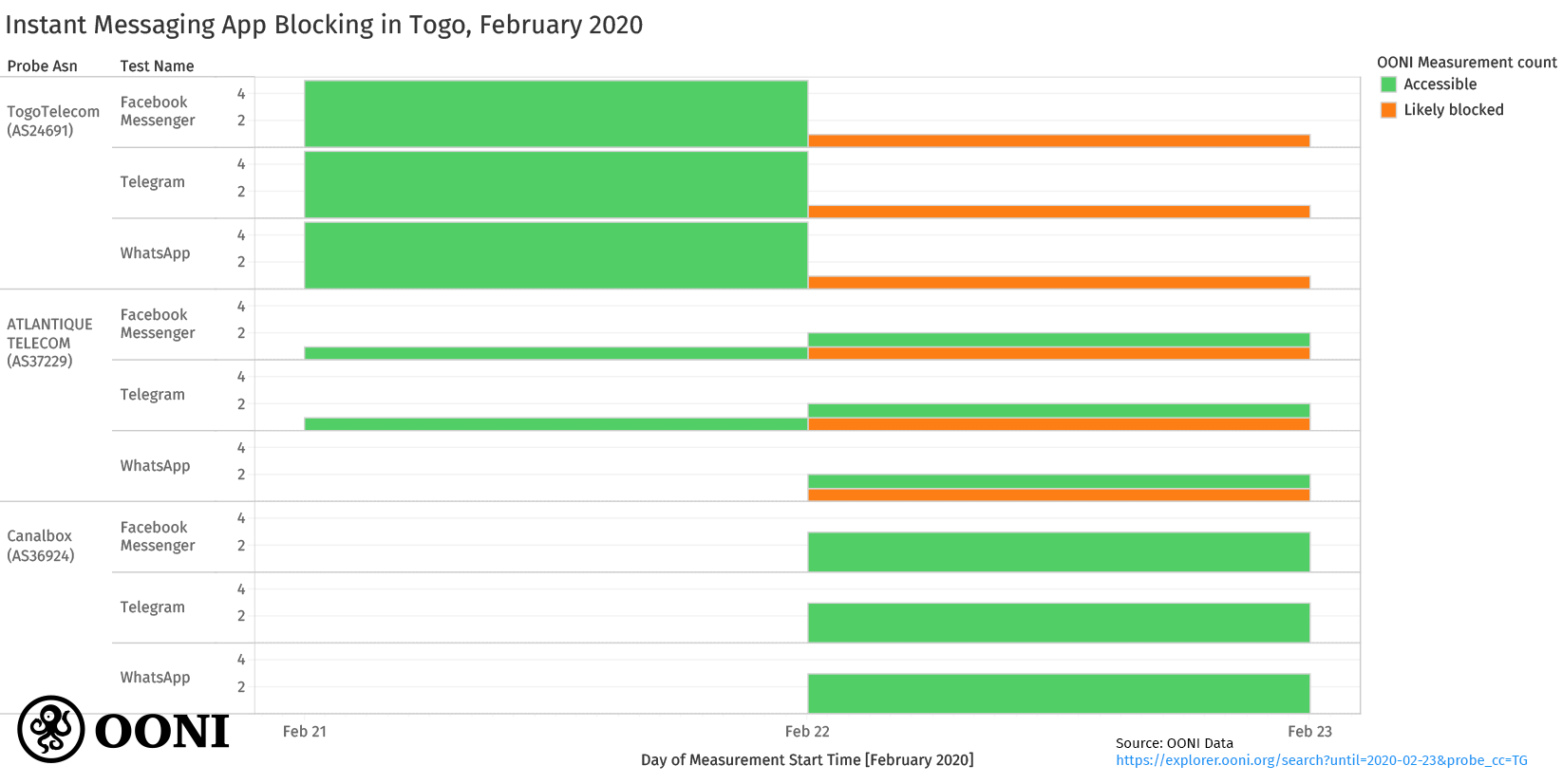
Source: OONI measurements collected from Togo
(extract of data used to produce the above chart is available here)
Measurements in the above chart are annotated as “likely blocked”
(rather than “confirmed blocked”) due to their relatively limited
volume. Yet, the fact that OONI measurements
show that these instant messaging apps were accessible in Togo before
and after the elections (from 24th February 2020) suggests that they
were most likely blocked on election day indeed.
WhatsApp
OONI’s WhatsApp test is designed
to measure the blocking of WhatsApp’s mobile app and web version
(web.whatsapp.com) by attempting to perform an HTTP GET request, TCP connection, and DNS lookup to WhatsApp’s
endpoints, registration service, and web version from the vantage point
of the user.
On 22nd February 2020, OONI’s WhatsApp test was run in Togo and
measurements
showed that while WhatsApp’s registration service and web.whatsapp.com
were accessible, access to WhatsApp’s endpoints were blocked on the Togo Telecom (AS24691)
and Atlantique Telecom (AS37229)
networks.
The following image (taken from an OONI WhatsApp measurement)
shows that attempts to establish TCP connections to WhatsApp endpoints
failed.
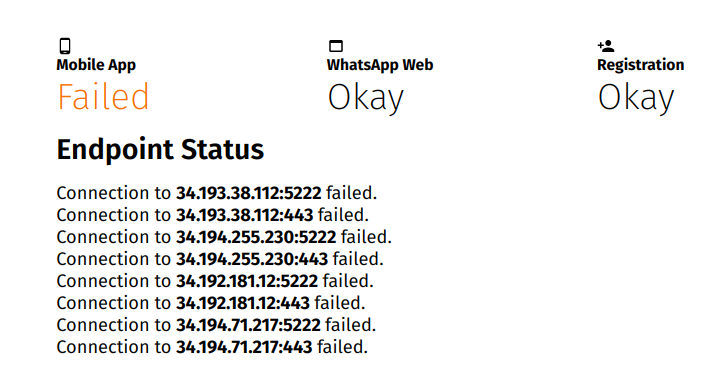
Source: OONI measurement collected from Togo,
22nd February 2020
This is observed on both the Togo Telecom (AS24691)
and Atlantique Telecom (AS37229)
networks on 22nd February 2020, suggesting that access to the WhatsApp
mobile app was blocked by means of IP-based blocking.
It’s worth highlighting that the IP addresses used by WhatsApp that
appeared to be blocked in Togo (the 34.192.0.0/10 netblock) are part of
the Amazon AWS Cloud, which means that the
block could have potentially led to interference of other services
reliant on the Amazon Cloud.
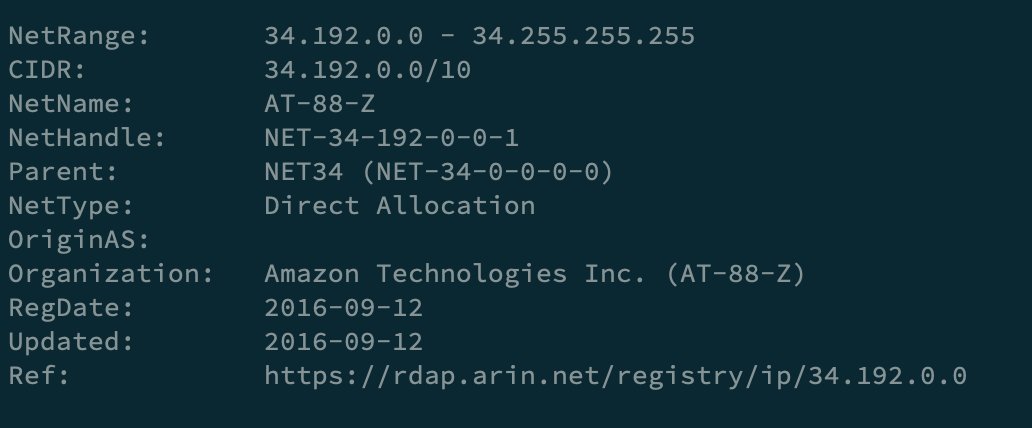
But even if some collateral damage did occur, it was probably
short-lived, as recent OONI measurements show that access to WhatsApp
has been unblocked on both Togo Telecom (AS24691)
and Atlantique Telecom (AS37229).
On election day, WhatsApp was not blocked on all networks in Togo. OONI
measurements show that the WhatsApp mobile app, registration service,
and web version were accessible on the Canalbox (AS36924) network
in Togo on 22nd February 2020, as illustrated below.
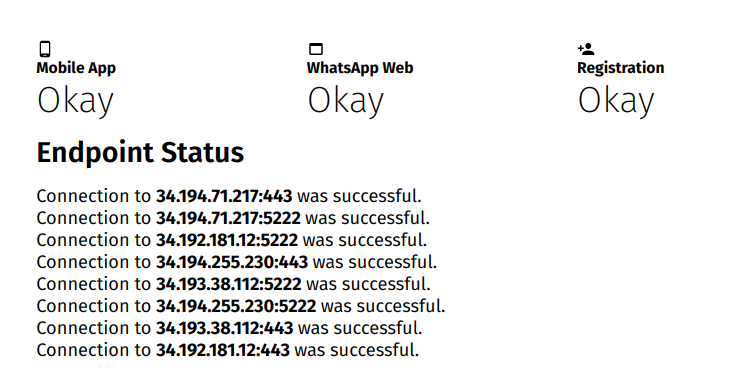
Source: OONI measurement collected from Togo,
22nd February 2020
Telegram
OONI’s Telegram test is designed
to measure the blocking of Telegram’s app and web version
(web.telegram.org) by attempting to perform an HTTP POST request and TCP
connection to Telegram’s access points, as well as an HTTP GET request
to web.telegram.org from the vantage point of the user.
This test was run in Togo on 22nd February 2020.
Measurements
collected from both Togo Telecom (AS24691)
and Atlantique Telecom (AS37229)
show that the HTTPS version of Telegram Web (web.telegram.org) appears
to have been blocked, as illustrated below.
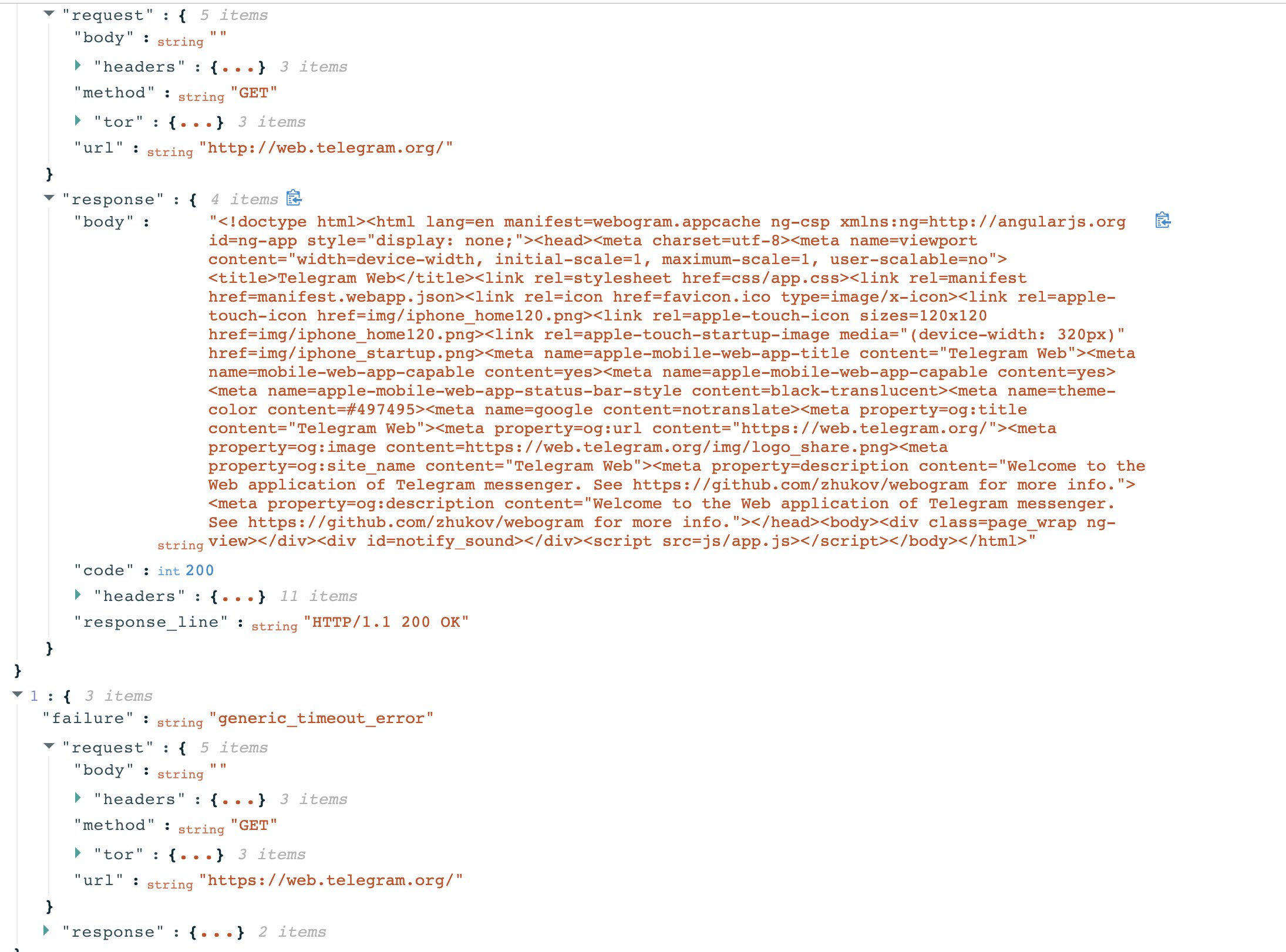
Source: OONI measurements collected from Togo,
22nd February 2020
It’s worth noting though that TCP connections to Telegram endpoints were
successful on both networks, suggesting that the Telegram mobile app
worked in Togo on election day.
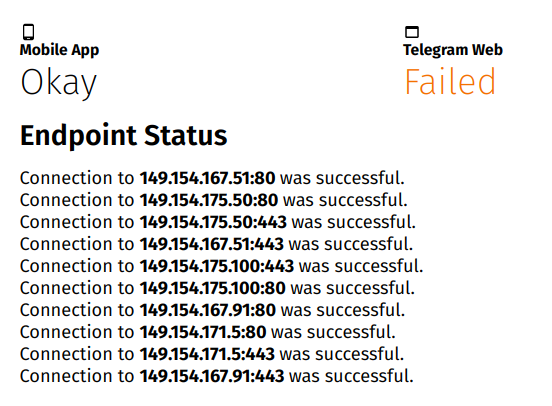
Source: OONI measurement collected from Togo,
22nd February 2020
Access to Telegram Web has since been unblocked on both Togo Telecom (AS24691)
and Atlantique Telecom (AS37229)
networks, as revealed by recent OONI measurements.
Facebook Messenger
OONI’s Facebook Messenger test is designed to
measure the blocking of Facebook Messenger by attempting to perform a
TCP connection and DNS lookup to Facebook’s
endpoints from the vantage point of the user.
When this test was run in Togo on 22nd February 2020, the collected
measurements
presented signals of potential Facebook Messenger blocking on both
Togo Telecom (AS24691)
and Atlantique Telecom (AS37229).
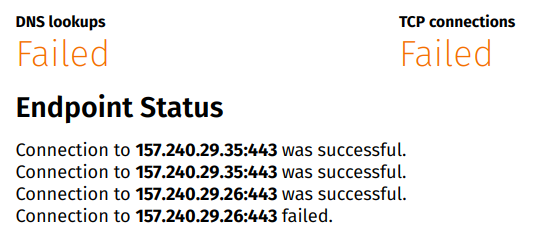
Source: OONI measurement collected from Togo,
22nd February 2020
However, given that most attempts to establish TCP connections to
Facebook endpoints were successful, it remains unclear if these
anomalies were caused by transient network failures or by intentional
blocking of the Facebook Messenger app.
It’s worth noting though that following the elections, recent OONI
measurements don’t show any signs of Facebook Messenger blocking on
Togo Telecom (AS24691)
and Atlantique Telecom (AS37229).
Conclusion
OONI
measurements
collected from Togo on 22nd February 2020 suggest the blocking of the WhatsApp mobile app
and Telegram Web,
as well as the potential blocking of Facebook Messenger.
All three instant messaging platforms appear to have been blocked on the
Togo Telecom (AS24691) and Atlantique Telecom (AS37229) networks, but
were accessible on the Canalbox (AS36924) network. This suggests that
internet censorship varies across networks in Togo.
As the blocking of WhatsApp endpoints
involved IP addresses that are part of the Amazon AWS Cloud, the block
might have potentially led to interference of other services reliant on
the Amazon Cloud. However, the block was
lifted
by 24th February 2020, suggesting that any potential collateral damage
was probably short-lived. Similarly, OONI measurements show that
Telegram Web
and Facebook Messenger
are accessible across networks in Togo from 24th February 2020 onwards.
As the network anomalies observed for WhatsApp, Telegram Web, and
Facebook Messenger in Togo are mostly limited to 22nd February 2020, the
platforms may have been blocked in correlation to the country’s
presidential election
on that day.
Longitudinal data is essential to enable the examination of censorship
events over time. To more accurately observe censorship changes and
spikes in correlation to political events (such as Togo’s recent
elections), it is necessary to collect relevant measurements on an
ongoing basis over time.
You can contribute measurements from Togo or anywhere else around the
world by running OONI Probe, which is
free and open source software designed to measure various forms of
internet censorship, such as the blocking of websites and instant
messaging apps. Network measurement data collected by OONI Probe users
around the world is openly published in near real-time, which you can use as part of your
research and advocacy.
We thank all OONI Probe users in Togo for
contributing
measurements
and making this study possible.